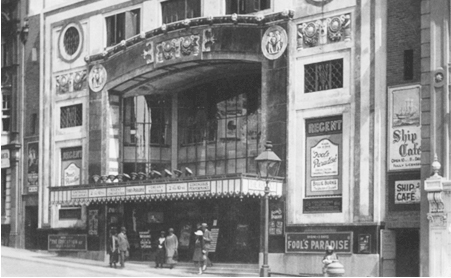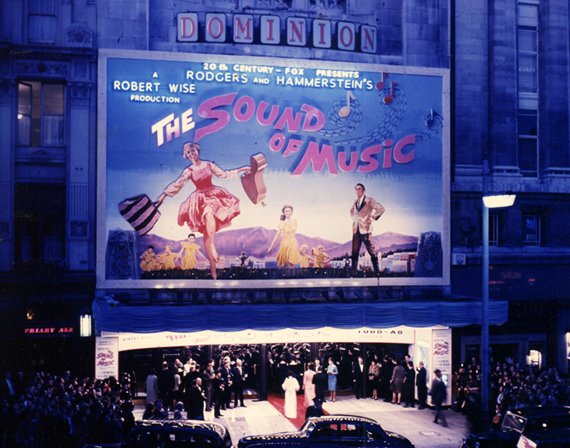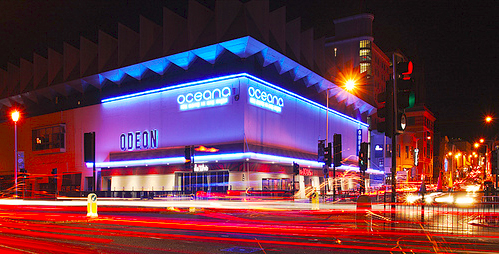INTRODUCING A LONDON CORRESPONDENT
BRIGHTON BOURNE
Editor's Note: The only place I have ever wanted to visit outside of the U.S. is London. Recently I was very pleased to discover that there is someone over there whose standards and passion for a theatrical moviegoing experience align closely with mine. His astute observations indicate that U.K. cinemagoing has many issues similar to those in the U.S., so there is much to commiserate about. There are still however, several exceptional movie showplaces in England, which gives us much to celebrate. Looking forward to all there is to see and hear about in British cinemas, I am proud to introduce our London Correspondent, Brighton Bourne...
I have just about come to terms with the fact that the colourful cinemagoing possibilities of my youth have declined, at least in England. However, reading the features on Cinema Sightlines, and the threads in the CS forums, took me back to the glorious days when cinemagoing was a memorable experience that you could share with a polite audience.
My love for the cinema started when I was a misplaced youth, whose parents had emigrated from the U.K. and left me behind to finish school. While other young men were enjoying family, social lives, and sports, I sought solace and pleasure at the Regent Cinema, in my home town of Brighton. Being a regular patron, who often went to the cinema three times a week, it was not long before I was on first-name speaking terms with the Regent staff and management.

Image from Brighton Cinema Directory by David Fisher
One day I received an invitation to visit the projection box. Being an inquisitive teenager, I jumped at the opportunity. I met the chief projectionist, who was thrilled to have a captive audience. What should have been a short visit extended into a long stay, as I was happily immersed in the projectionist’s world. When the performance ended, the chief directed me to operate a few knobs and switches that controlled some lights and drew the curtains. It was a thrill - like being in control of a jet aircraft! From that moment, I knew the cinema was where I wanted to be.
The cinema manager and projectionist were very friendly, and soon adopted me as a member of the ‘family.’ I spent a large amount of my pocket money subscribing to Screen International (the cinema trade journal) and passed all copies to the manager after I read them. In return, I was given a staff pass that gave me two complimentary tickets each week for a year.
One evening, when a new film opened, the cinema was exceptionally busy, and some staff members had not turned up. I volunteered to help, and became an usher for the night. I must have made a good impression, as I was asked if I would be interested in becoming a member of the staff. I was told I could then see all films free, but even without this incentive, I still would have seized the opportunity.
At the age of 16, during an extended summer break from school, I became an usher at the Regent. I quickly progressed up the ladder to the concessions, cashier, and then boxoffice supervisor. I enjoyed being in a cinema and meeting people so much, that the holiday job became a part-time occupation. When I returned to school, I studied during the day, working evenings and weekends in the cinema.
When my studies took me to London, I worked for the same company at a West End showcase: the Dominion Theatre in Tottenham Court Road. The Dominion had an impressive history, including live appearances by Charlie Chaplin, Sophie Tucker and Judy Garland, plus the U.K. film premieres of SOUTH PACIFIC and CLEOPATRA. My job there began when the four-year roadshow engagement of THE SOUND OF MUSIC was in its final weeks, prior to a major refurbishment for the World Premiere of STAR!

Image Courtesy of Cinema Theatre Association
Moving from a provincial cinema to the Dominion was like moving from a two-star to a five-star hotel. The job was more difficult, the patrons more demanding, however, it was fun to me, and I enjoyed every minute of it. The Dominion's projection box was like a laboratory - it was immaculate. All projectionists wore white overalls and white gloves whenever they handled the films. I often thought this would be the nearest that I would ever get to Hollywood, so I did my job as best I could.
Sadly, working so many hours became such a strain on my studies, that I had to resign from my job at the Dominion. I still visited the cinemas whenever the opportunity arose, strangely choosing the cinema rather than the film; such was my addiction to visiting all the London picture palaces.
A few years later, I had moved on from school to fulltime employment, and bought my first home. Needing supplemental income to afford my mortgage repayments, I returned to a part-time cinema job. This time I worked at one of the U.K.’s first purpose-built triple-screen cinemas – the Brighton Odeon, which is still operating today, having had three further screens added, and the larger auditoriums being split into smaller cinemas (eight screens in total now).

Photo © CowGummy
This job took me into the office, where I was away from the public. Although I missed dealing with the patrons, I was helping the management run the complex. This position brought me into contact with other cinema managers, and I was learning much about cinema operations, publicity, administration etc. I remained in this job for four years, by which time I could afford to live modestly.
With spare time in the evenings and at weekends, I still visited the cinemas as a patron. I enjoyed the experience, but then I noticed standards were slipping. The large, palatial, single-screen cinemas, where the back and front rows were in different time zones, were closing, replaced by small screens in plain multiplexes, where the ushering staff would need coal miners’ helmets (as there was no room to swing their flashlights). Teenagers wearing t-shirts replaced smart uniformed staff. Even managers, who once wore a dress suit for the evening, would rarely wear a tie.
Grand drapery gave way to bare screens. Everything in the projection box seemed to be in automatic mode, so faults often went unnoticed, or it took a long time before a technician appeared to rectify them. 35/70mm film prints are now being replaced by 2K digital files, and the DD on some cinema marquees seems to stand for Deadly Dull rather than Dolby Digital. Moreover, the behaviour of fellow cinemagoers is getting worse. Mobile phones for texting, and loud calls during the film are all-too-common among the commoners.
I stumbled across Cinema Sightlines following a link in IMDb, and the article on Cinema Etiquette particularly caught my attention. Brilliantly written, it highlights all that is wrong with the cinema today: bland multiplexes with shoddy presentation, high prices, and the most annoying aspect of all, fellow cinemagoers who do not know how to behave in a theatre, let alone in public.
Some cinemagoers – by which I mean; specifically me and TJ – have an emotional attachment to the standards of presentation, comfort and service in a cinema, and wish to be theatrically immersed in the enjoyment of the film, rather than listening to other people adding their own soundtrack to the movie.
I remember, in the better days of cinemagoing, the buzz of excitement as people took their seats. An air of expectation filled the auditorium. The lights faded, silence fell, and music swelled. The curtains opened, and… magic! Sharing the laughter and thrills with an attentive audience made the occasion more memorable and enhanced the enjoyment. Let’s bring back the real cinema experience. That’s what I wish for, and that’s why I’m here.
- Brighton Bourne
Upcoming features from Brighton Bourne will explore the current cinema scene and some exceptional cinemas in England.
For questions and comments, contact Brighton Bourne
Discuss the London Cinemagoing scene on Cinema Sightlines Message Boards